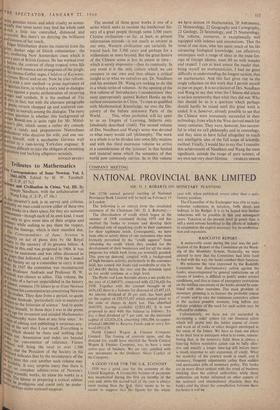King-Size Chronicle
IT is slightly chastening to read Allen Drury's Advise and Consent, the enormous novel about
Washington which has led the American best- seller lists since last September. For one thing, there are its 638 pages. For another, it reminds one summarily•that fiction, before it can aspire to literature, is a commodity: a product whose forms, content and packaging reflect the condi-
tions of a buyers' market. One of these conditions is that there are not enough chronic fiction readers to support a fiction industry—not even a cottage one like ours. The. industry lives by its best sellers : the novels which, from Ben Hur to Zhivago, reach out and snare the vast, unreading public whose interests are religion, politics and sex. Another, today, is competition with television:. Fiction has had to fight to keep its audience, just as the cinema has fought, and with many of the same weapons. It has had to offer what the small screen cannot—size, colour, spectacle, irreverence, themes which would scare sponsors with family products. At the same time, it has had to match television's strengths : the newsy sense of actual- ity, the documentary eye on public events. With reservations, I find these conditions salutary. They cannot enforce—what can?—good novels. They can make for novels concerned with real life, offering more than one kind of value for money. Without meddling in greatness, Advise and Con- sent offers what the supermarkets would un- doubtly call jumbo value. It conflates the pleasure- able old desert:.island gimmick (ninety-nine disparate strangers trapped together in a locked Senate) with a monster, bourbon-breathed cock- tail of every Washington drama since the war. A president rather like Roosevelt nominates a Secre- tory of State not unlike Acheson, only to find 10 lain he has a past reminiscent of Alger Hiss. There °, rnie; likenesses of Truman, McCarthy, Taft; Jewell sket diplomatic revels within the colonial porticoes , dear political millionairesses; peeps through the elg3, and murk of the Senate wash-rooms, and—let 1elr E vision beat this—an interior monologue in t'.0thi presidential bed. Mr. Drury, for years one gat, James Reston's captains in the New York tio\‘ Washington bureau, still writes more as It bi columnist than a novelist, with narrative dew' with
of the meanwhile-the-same-sunrise-is-gild' t in h
variety which even Thackeray outgrew. Kat Capitol panorama is mostly two-dimension lag already rather dated (his Soviet ambassador shou" MON inia him of f the chill shadow on this of the Soviet sputniks. Iasi; serf( indt, hol2 al)°, venom at parties) and curiously devoid a, second chamber. But if his novel holds few re' characters, it has genuine emotions, abo] America, its fantastic, rising golden legend a
is chastening, too, to consider how little we .na here of such public drama. We seem less than democracy without it.
Maria Dermout's Days Before Yesterda evokes its small, bright world of a colonial ellil , Phil; hood in Java sixty years ago by methods ,tb Peet reverse of Mr. Drury's—selection, indirect'? it, implication. Her previous book, The 7c. beet Thousand Things, rehearsed with the poignal/ Vegc detail the title suggests a lifetime's loss—no ilan°„ seems to have parted with its empire so painfu", as the Dutch with their green, beloved ladle' Here nostalgia is confined to the memory of tel year-old Rick, playing by herself on the marbi, estate-house verandah, listening to the servant bed-time gossip, and learning the meaning of 1°r Scie from a half-understood affair between her you uncle and a neighbour's wife. Mme Dermout lel a few images evoke the background of blue moor
The
14 5 THE SPECTATOR, JANUARY 22, econo- mically that some tastes may find the whole cool , and sureness of her touch. eat, sweltering New Amsterdam coast which is a before, the contrast of cheap tropical town life ' with the rich menace and strangeness of the jungle, 1„11 it with a new method—a prose equivalent of twins, gamelan music and adult cruelty so econo- dt://seitb/e. But there's no denying the brilliance " Edgar Mittelholzer draws his material from the sketch a little too controlled, distanced and I,! his cinema-Gothic sagas, Children of Kaywana, I.1°w a part of British Guiana. He has worked over „tiler, danker edge of Dutch colonisation: the !s•tlYwana Blood and so on. Now he tries refresh- ing form, in which a story told in dialogue moves against a poetic orchestration of recurring rages and symbols. It is the method of The
"es, in fact, but with the alternate paragraphs
;1 Poetic reverie chopped up and scattered con- ,”nglY in morsels among the dialogue. The more r,IPus question is whether this background of rutgo Bronte-ism is quite right for Mr. Mittel- ,91zer's plot, which seems a rather dry comedy about a randy and preposterous Nietzschean bhilanderer who deceives his wife, and one sus- ..Ncts himself, with a saccharine German waif I,rried to a rum-loving Yorkshire engineer. It bee wiles difficult to take the obligato of swooning ygetation and barking alligators seriously.
RONALD BRYDEN



































 Previous page
Previous page